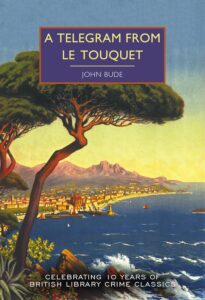
A Telegram from Le Touquet
by John Bude
Series: British Library Crime ClassicsRating:

Synopsis:With some trepidation Nigel Derry approaches the country house of his enigmatic and unpredictable aunt Gwenny for an Easter holiday visit. After a tense few days in which her guests’ interactions range from awkward dinners to a knife fight, a disgruntled aunt Gwenny departs for Europe. Receiving a telegram from Le Touquet inviting him to join Gwenny in the south of France, Nigel finds himself on a vacation cut short by murder as a cold shadow of suspicion eclipses the sunny beauty of the Côte d’Azur.
Enter Inspector Blampignon of the Sûreté Nationale, whose problems abound as the case suggests that the crime may have occurred hundreds of miles away from where the victim was discovered. Undeterred, the formidable French detective embarks on a thrilling race to discover the truth in this rare and spirited mystery novel, first published in 1956.
A Telegram from Le Touquet is pretty much what one expects of John Bude: a mostly competent mystery without flair, with a few thumbnail sketches of characters but not great psychological depth. It starts with a section from the point of view of someone who eventually becomes a suspect, Nigel, allowing Bude to set the scene for Gwenny and her web of jealousies and secrets. After that, we turn to the mystery proper, with the scene set with a few unpleasant people and a few nondescript generic character types.
Certain aspects of it I had worked out pretty quickly, but the pieces didn’t all fit together right away, which kept me occupied for a while, but mostly I didn’t get super interested in the cast and who might be the killer, and I kind of suspected the alibi thing pretty early on. Inspector Meredith makes a tiny cameo, but it’s mostly Blampignon (who also appeared in Death on the Riviera). Meh either way, really.
This all sounds like damning with very faint praise, but it was reasonably well paced, it sowed clues and didn’t spend too much time belaboring them, and sometimes in the very predictableness of mysteries of this era there’s a sort of comfort.
Rating: 3/5




